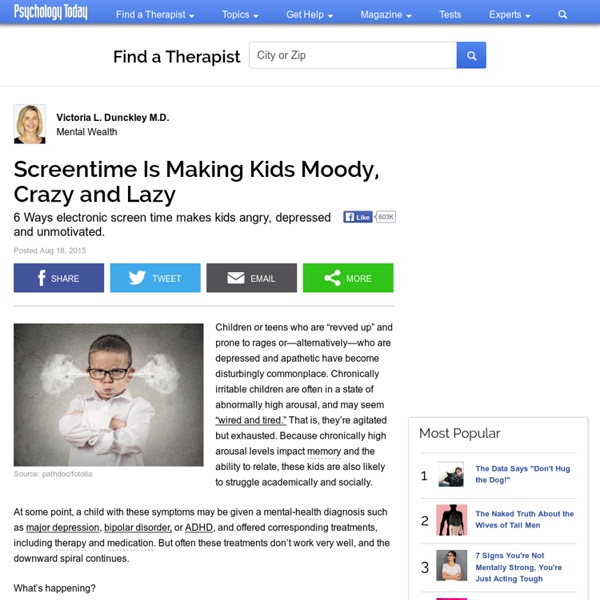Zoom
Trash



Your iPhone Is Ruining Your Posture — and Your Mood Photo THERE are plenty of reasons to put our cellphones down now and then, not least the fact that incessantly checking them takes us out of the present moment and disrupts family dinners around the globe. But here’s one you might not have considered: Smartphones are ruining our posture. And bad posture doesn’t just mean a stiff neck. Top 5 Benefits of Technology in the Classroom Resource Articles // Technology has transformed life as we know it, and the classroom looks much different than it did 50—or even 10—years ago. Traditional chalkboards have been replaced with digital whiteboards, and classrooms have a surplus of iPads. Why Steve Jobs Didn’t Let His Kids Use iPads (And Why You Shouldn’t Either) If you fall within the Gen-Y era like us, chances are you’ve given a bunch of thought as to how you would raise your own children in this day and age (assuming you don’t have children already). Especially with technology, so much has changed since our childhoods in the 90s. Here’s one question: Would you introduce the technological wonder/heroin that is the iPod and iPad to your kids? Steve Jobs wouldn’t, and for good reason too. In a Sunday article, New York Times reporter Nick Bilton said he once assumingly asked Jobs, “So your kids must love the iPad?” Jobs responded:
How much screen time is OK for my kid(s)? I agree with PiperBoj completely. With me, I get to play 1 hour on weekdays, and 2 hours on weekends, after chores, homework, and other related stuff. I've learned to deal with the time limit, even though I still disagree with it. But my biggest problem with my parents, especially my dad, is the automatic screen time limit put on my PC, and also time periods when I can play, which my dad never remembers to fix. Of course I don't agree with all these things.
Sesame best practices guide for children's app development Touch screen technology is revolutionizing interactive digital experiences for children. No longer do our little ones need to wait to learn to navigate a mouse or press keyboard keys in order to access a host of interactive content designed for them. Instead, we see toddlers and preschoolers confidently navigating their parents’ iPhones, iPads, and other touch screen devices with astonishing agility and purpose. The explosion of apps for young children is not surprising; there is high demand and high appeal. Does technology hinder or help toddlers' learning? 19 April 2013Last updated at 17:38 ET By Philippa Roxby Health reporter, BBC News Screen time could help children as young as two to learn words and be curious Children under five years old have an uncanny knack of knowing how to master new technology. From smart phones to tablet computers and game consoles, it is not unusual to see toddlers intuitively swiping screens and confidently pressing buttons. Even if parents enjoy the momentary peace that comes with handing a small child a gadget to play with, parents secretly worry that this screen time is damaging their brains.
Outdoor, indoor, technology, nature – it’s all important child’s play by Rachel Broadley Jane Webb-Williams (centre) observing children playing. There’s a very good reason why children are encouraged to play – whether it be with toys, everyday household objects, nature or technology – it has implications for development that can reach well into adulthood, according to a UniSA researcher. Dr Jane Webb-Williams, whose research interests involve self-perceptions, play and identity within childhood, says research suggests play contributes to emotional, social, cognitive and physical development. “Play develops self-esteem, resilience, identity and relationships, concepts, thinking, concentration, language, understanding and physical skills and coordination,” she says.
Balance Technology With Outdoor Play Time for Healthier Kids - Parenting - NewsUSA Copyright-Free Articles (NewsUSA) - Many children are too busy tweeting to go outside and hear a real tweet. Kids today spend an average of seven hours per day using electronic media but only four to seven minutes outside in unstructured outdoor play time. "The importance of media in today's world is indisputable, but a sky's-the-limit approach to technology can have a powerful downside for kids if it's not tempered with something more down to earth," said Lindsay Legendre, manager of the National Wildlife Federation's Be Out There movement -- an effort to get more children outdoors more often. Research shows that spending time outdoors makes kids grow lean and strong, enhances their imaginations and gives them time to let off steam and just be kids. The Kaiser Family Foundation says children who spend too much time with technology are more likely to get fair or poor grades.